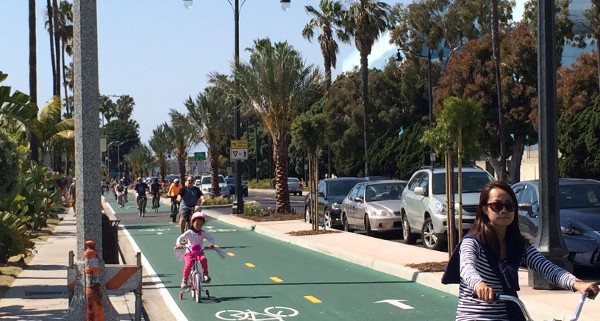These City DOT Leaders Get It. What’s Standing in Their Way?
Many city leaders have come to realize that making their streets and sidewalks more walkable and bikeable is key to a better city: more prosperous, more equitable, more healthy. They have appointed changemakers to be city DOT leaders, in charge of their streets: people with careers dedicated to advancing that transformation.
The Opening Plenary of this year’s California Bicycle Summit, held October 15-17 in Los Angeles, features three such leaders. Seleta Reynolds is the General Manager of LADOT. Before that, she was in charge of bike and pedestrian programs in the Liveable Streets section of the SFMTA. Ryan Russo moved from a position as Deputy Commissioner working on bike projects for NYCDOT to become the first director of the newly-formed Oakland DOT. Kome Ajise is the Executive Director of the Southern California Association of Governments. Before that, he was a Chief Deputy Director at Caltrans, where he was a strong ally to our work to make projects bicycle- and pedestrian-friendly.
A History of Cutting-Edge City DOT Bikeway Projects
Russo’s tenure at NYCDOT saw a huge expansion of public space, with the addition of pedestrian plazas at several locations, including Madison Square and innovative projects such as protected center bike lanes to help bicyclists ride onto the Manhattan Bridge.
As a result of bold, innovative projects like these, the number of bike riders in New York City tripled between 2003 and 2018. The city now has 330 miles of bike lanes, including 82 miles of protected bikeways.
Since Russo became head of OakDOT in 2017, Oakland has developed a new bike plan that proposes adding 219 miles of bike lanes to the existing 164. The city has opened a two-way protected bikeway by Lake Merritt that might be the best urban protected bikeway in California.
Reynolds moved to LADOT in 2014 and presided over the opening of LA’s first two-way protected bikeway on Spring Street this year. Under her watch, the My Figueroa project proposes to add three miles of a bikeways to a reconfigured Figueroa Street that also includes safety upgrades for pedestrians.
City DOT Progress Denied
Despite these improvements, a 2018 article in Bicycling Magazine called Los Angeles the “worst bicycling city in America,” pointing to a rampant car culture and organized opposition to bike infrastructure. Opposition led by the City Councillor forced the city to scale back the My Figueroa project. Entitled motorists got so enraged about delays caused by a safety project on Vista del Mar in Playa del Rey that in 2018 they attempted to recall the City Councillor who supported it. That effort failed and Mark Bonin remains in office and an ally, though somewhat scarred. Vista del Mar, unfortunately, saw its traffic lanes restored and safety improvements eliminated.
Oakland has avoided the reversal of a bike lane project but not the delay of one. A planned extension of Oakland’s wildly successful Telegraph Avenue parking-protected bike lanes was only recently approved after more than a year of delay. Still, there is constant pressure to reject additional expansions, according to officials.
How Do We Speed Up the Process for City DOT Leaders?
The exact right people are in the exact right positions to make change in Oakland and Los Angeles, yet progress is slow and pushback remains a strong force against safer streets. How do these leaders overcome resistance from entrenched interests, both inside and outside of government? How can bicycle advocates support their work? And, since Reynolds and Russo are working to achieve statewide goals, is there a role for the regional or statewide agency that Kome Ajise leads? What incentives, rewards, and punishments can Caltrans or a regional agency administer to get the result we’re seeking?
Moderated by the California-focused leader at the National Association of City Transportation Officials, this session at the California Bicycle Summit will help us learn from allies in positions of power what they need to be more successful. Register for the California Bicycle Summit: Intersections to join the conversation.





